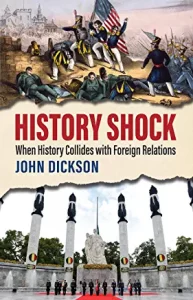Review — HISTORY SHOCK: When History Collides with Foreign Relations by John Dickson (Gabon)
 History Shock: When History Collides with Foreign Relations
History Shock: When History Collides with Foreign Relations
by John Dickson (Gabon 1976-1979)
University Press of Kansas
248 pages
June 2021
$26.49 (Kindle); $34.95 (Hardcover)
Review by Eric Madeen (Gabon 1981-83)
•
John Dickson’s recently released book History Shock: When History Collides with Foreign Relations is ambitious and makes good on its ambitions: to delineate where and when America’s foreign policy “spills across national boundaries.”
Indeed: how this book spills across the world map! As he notes, recently no other country blundered as much and easily as the United States, resulting in countless faux pas, cross-cultural insensitivities, outright missteps and innumerable aggressions, all adding up to obstructions of cooperative efforts on mutual interests.
There’s much ground covered with chapters on Mexico and Canada (both partly concern “Forgotten Wars” there and the shocking reminder that the United States seized half of Mexico’s territory as a result of wars instigated by Machiavellian politics at the presidential level on down), Nigeria, South Africa, Haiti, Peru, Cuba then wrapping up with a chapter that connects the dots as in drawing pithy conclusions.
Dickson puts to good use his studies at Princeton where he majored in history, four years of service in Peace Corps/Gabon as a high-school TEFL teacher (he now edits The Gabon Letter)’ and most impressively a long career as a Foreign Service officer with the US Information Agency from 1984-1999, then with the US State Department from 1999-2010.
He describes how Foreign Service personnel were and are described as “pale, male and Yale” — up until 1972 female officers were forced to resign when they married. He said there is some effort to place personnel in foreign countries in keeping with their ethnicities and cultural heritage but that they fall short and ironically: “When, inevitably, national interests trump ties of heritage, such heightened expectations could turn to disappointment, on both sides.”
The book’s laden with minutiae. Did you know that the withdrawal of tariffs from corn coming from the United States created an influx of imported corn that could drive down prices for subsistence farmers in Mexico? That the original NAFTA provisions kept tariffs on maize at a whopping 200 percent . . .? That the 2010 earthquake in Haiti lasted just a few minutes but ranks as one of the most destructive natural disasters in recorded history? That it “pancaked” roofs there? That this book is jam-packed with such factoids?
But it’s not all bleak. A case in point being how the United States got it right with Peru by using soft power to ameliorate efforts to protect the nation’s precious archaeological sites. Other kinds of power he describes are hard power, smart power (with a nod to Hilary Clinton’s coinage), and sharp power as in the recent spate of information cyber attacks.
In a review of a tome so meticulously researched and in many parts lived through, it was at times hard for this reviewer to step back and see the enormity of the message that “by cherry-picking those events that helped construct a nation that is exceptional, the United States has consistently overlooked that slice of its history that does not correspond to its self-image.”
Moreover, toward the end of my mining the book I found a creative gem of an analogy made all the more precious by his quoting Gore Vidal’s referring to the US as “the United States of Amnesia.” Dickson cites research to tell us that mockingbirds have a more developed sense of memory with the ability to call out more complicated, differentiated songs than crows. “The United States of Amnesia uses memory and historical awareness less, making us more like the crows, with an underdeveloped HVC (high vocal center). By neglecting history, we are less able or willing to draw on memory to aid in how we learn, make decisions, behave, or develop new strategies.”
That’s all well and good but where I live the wily survivor of nature is indisputably the crow. They are, needless to say, expert at laser focusing on where food scraps can be found, even on my terrace where they brazenly pecked their way through cardboard boxes to get at fruit we left out in winter because the fridge was full. Meanwhile, atop a nearby tree perched the scout, as is most often the case, and just as I would open the door to shoo the trespassers, out went the warning calls of such scout amidst much cawing and flapping. However, I don’t see any mockingbirds.
Circling back to Dickson’s thesis, I’m inclined here to liken America’s misbehavior domestically and internationally in no small part to Rousseau’s philosophy that has it that inequality arises when people form societies and compete with one another with a dash of Marquis de Sade thrown in: that our “logic” is in service to our primal instincts at the basest. Appealing to the higher mind here, I should nonetheless add that that’s not what we’re about on this platform . . ..
In any case, making the world less dog-eat-dog goes with the awareness of the bleaker points of our history as delineated so lucidly in History Shock. Our leaders should read this fine book and . . . eat crow.
•
Eric Madeen (Gabon 1981-83) works out of Japan as an associate professor of English at Tokyo City University, adjunct professor at Keio University, and author most recently of Asian Trail Mix: True Tales from Borneo to Japan. His Peace Corps inspired novel Water Drumming in the Soul: A Novel of Racy Love in the Heart of Africa is featured along with his other books, sundry interviews and reviews at www.ericmadeen.com.
Thanks for publishing the review, John and Marian. Great book by the way and impeccably researched. Well worth a look.